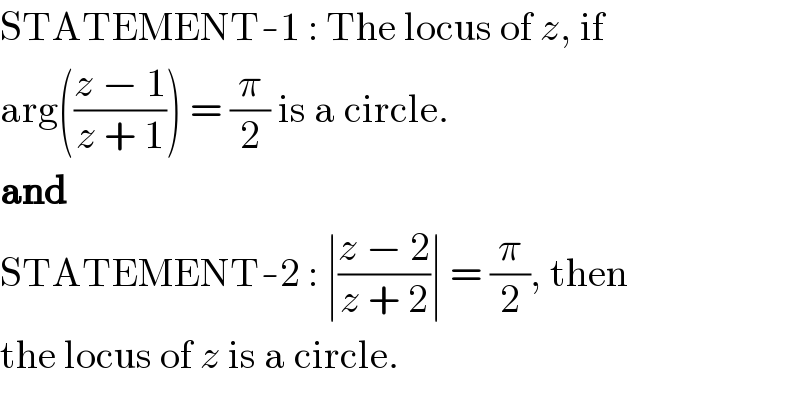
Question and Answers Forum
Question Number 21109 by Tinkutara last updated on 13/Sep/17

Commented by youssoufab last updated on 13/Sep/17
![arg(((z−1)/(z+1)))=(π/2) ⇔arg(((z−1)/(z+1)))=arg(i) ⇔((z−1)/(z+1))≡i[2π] ⇔z−1≡(z+1)i[2π] ⇔z−1≡zi+i[2π] ⇔z(1−i)≡i+1[2π] ⇔z≡((i+1)/(1−i))[2π] ⇔z≡(((i+1)^2 )/((1−i)(i+1)))[2π] ⇔z≡((−1+2i+1)/(1+1))[2π] ⇔z≡i[2π] z is a cercle⇒z=i](Q21128.png)
Commented by Tinkutara last updated on 13/Sep/17

| ||
Question and Answers Forum | ||
Question Number 21109 by Tinkutara last updated on 13/Sep/17 | ||
 | ||
Commented by youssoufab last updated on 13/Sep/17 | ||
![arg(((z−1)/(z+1)))=(π/2) ⇔arg(((z−1)/(z+1)))=arg(i) ⇔((z−1)/(z+1))≡i[2π] ⇔z−1≡(z+1)i[2π] ⇔z−1≡zi+i[2π] ⇔z(1−i)≡i+1[2π] ⇔z≡((i+1)/(1−i))[2π] ⇔z≡(((i+1)^2 )/((1−i)(i+1)))[2π] ⇔z≡((−1+2i+1)/(1+1))[2π] ⇔z≡i[2π] z is a cercle⇒z=i](Q21128.png) | ||
Commented by Tinkutara last updated on 13/Sep/17 | ||
 | ||